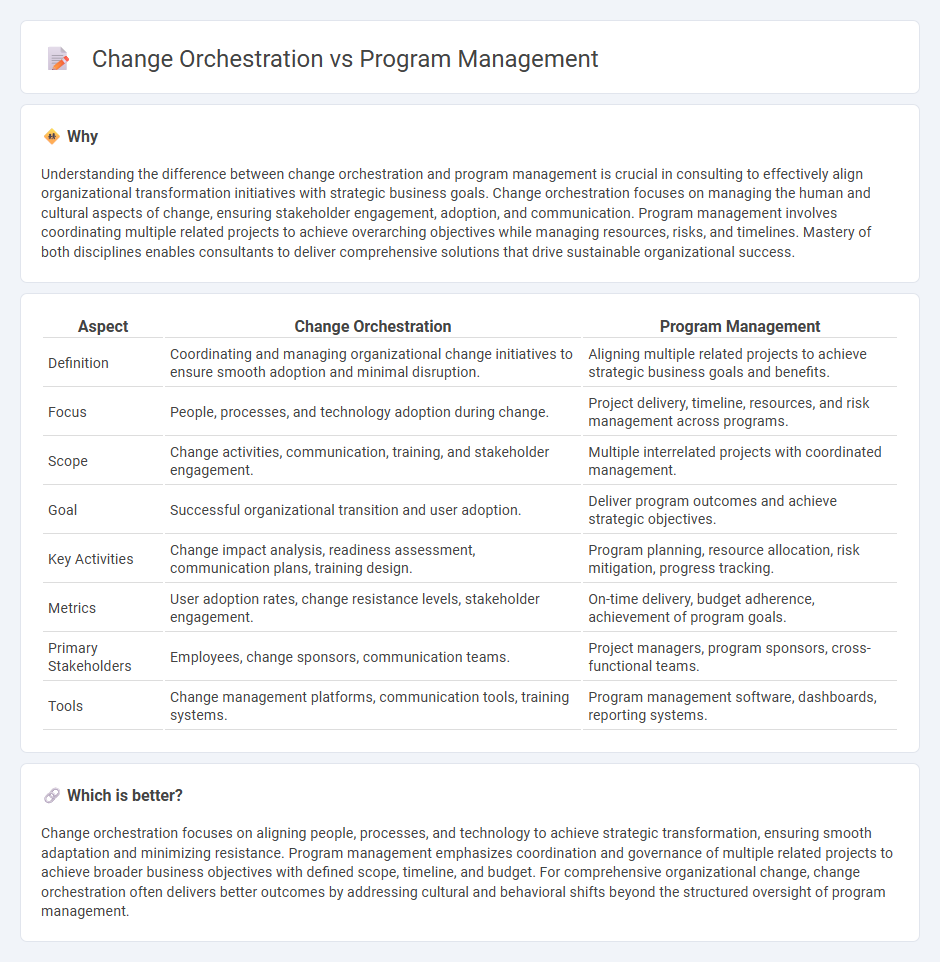
Change orchestration focuses on aligning organizational culture, processes, and stakeholders to ensure seamless adoption of transformation initiatives, while program management emphasizes coordinating related projects to achieve strategic business objectives. Effective change orchestration drives employee engagement and minimizes resistance by facilitating communication and training, whereas program management ensures resource allocation, risk mitigation, and timeline adherence across portfolios. Explore how integrating both approaches can maximize transformation success and organizational agility.
Why it is important
Understanding the difference between change orchestration and program management is crucial in consulting to effectively align organizational transformation initiatives with strategic business goals. Change orchestration focuses on managing the human and cultural aspects of change, ensuring stakeholder engagement, adoption, and communication. Program management involves coordinating multiple related projects to achieve overarching objectives while managing resources, risks, and timelines. Mastery of both disciplines enables consultants to deliver comprehensive solutions that drive sustainable organizational success.
Comparison Table
| Aspect | Change Orchestration | Program Management |
|---|---|---|
| Definition | Coordinating and managing organizational change initiatives to ensure smooth adoption and minimal disruption. | Aligning multiple related projects to achieve strategic business goals and benefits. |
| Focus | People, processes, and technology adoption during change. | Project delivery, timeline, resources, and risk management across programs. |
| Scope | Change activities, communication, training, and stakeholder engagement. | Multiple interrelated projects with coordinated management. |
| Goal | Successful organizational transition and user adoption. | Deliver program outcomes and achieve strategic objectives. |
| Key Activities | Change impact analysis, readiness assessment, communication plans, training design. | Program planning, resource allocation, risk mitigation, progress tracking. |
| Metrics | User adoption rates, change resistance levels, stakeholder engagement. | On-time delivery, budget adherence, achievement of program goals. |
| Primary Stakeholders | Employees, change sponsors, communication teams. | Project managers, program sponsors, cross-functional teams. |
| Tools | Change management platforms, communication tools, training systems. | Program management software, dashboards, reporting systems. |
Which is better?
Change orchestration focuses on aligning people, processes, and technology to achieve strategic transformation, ensuring smooth adaptation and minimizing resistance. Program management emphasizes coordination and governance of multiple related projects to achieve broader business objectives with defined scope, timeline, and budget. For comprehensive organizational change, change orchestration often delivers better outcomes by addressing cultural and behavioral shifts beyond the structured oversight of program management.
Connection
Change orchestration aligns cross-functional teams and resources to ensure seamless implementation of transformation initiatives, driving strategic objectives. Program management structures and oversees multiple related projects, providing governance and performance tracking to achieve business goals. Together, they enable coordinated execution and adaptive management of organizational change for sustained success.
Key Terms
Governance
Program management emphasizes structured governance frameworks to ensure alignment of multiple projects with strategic objectives, utilizing standardized processes and performance metrics to steer delivery. Change orchestration focuses on dynamic governance that adapts to evolving organizational needs, integrating stakeholder engagement and continuous feedback loops to facilitate smooth transitions. Explore how tailored governance models can optimize both program management and change orchestration for enhanced organizational success.
Stakeholder Alignment
Program management ensures stakeholder alignment through structured governance, clear communication channels, and milestone tracking across multiple projects. Change orchestration emphasizes dynamic stakeholder engagement, real-time feedback loops, and adaptive strategies to drive consensus and commitment. Explore how these approaches uniquely optimize stakeholder alignment for organizational success.
Implementation Strategy
Program management centers on overseeing multiple related projects to achieve strategic business objectives, ensuring alignment with organizational goals and resource optimization. Change orchestration emphasizes guiding people, processes, and technology through transformation with a focus on communication, stakeholder engagement, and adoption rates. Explore in-depth strategies to enhance your implementation success and drive effective organizational change.
Source and External Links
What is Program Management? | Definition and Overview - Program management is an organizational function that oversees multiple related projects aligned to a shared goal, providing strategic oversight, coordination, consistent governance, and budget management to ensure delivery of large-scale initiatives that require cross-functional cooperation.
Program management - Wikipedia - Program management involves managing several projects that together support an organization's strategy or transformation, focusing on resource coordination, prioritization, risk and cost management, distinct from project management and often used in fields like business transformation and defense.
Program management vs. project management - Atlassian - Program managers run programs by managing budgets and resources, engaging stakeholders to understand broader goals, refining operating models, optimizing processes, and supporting decision making to improve organizational performance across multiple projects.
 dowidth.com
dowidth.com